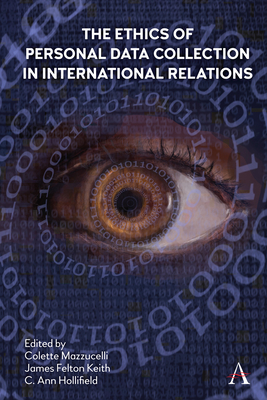The Ethics of Personal Data Collection in International Relations: Inclusionism in the Time of Covid-19

The Ethics of Personal Data Collection in International Relations: Inclusionism in the Time of Covid-19
This volume's relevance may be explained, first and foremost, during a time of unprecedented loss of life around the world each day. The data, which is oftentimes incomplete and misleading, nonetheless reveals the state as deficient as well as negligent in its response to social healthcare needs. This volume attests to the fact that pressing global public health concerns are ever present as subjects of societal discourse and debate in developed and developing states. Moreover, the COVID-19 pandemic makes the omission of the ethics of personal data collection analysis in the international relations literature even more salient given the rise of contact tracing and increased uses of mobile phone Apps to track citizens by states and firms across the globe, as this volume's chapters analyzing the responses to COVID-19 in Iran and Taiwan explain. For this reason, dialogue connecting research and practice is necessary to identify ways to address these emerging challenges at the conceptual, economic, legal, political, and social levels. The perspectives of researchers and the experience of practitioners must come together to bring the discussion forward. In response to this plea, a community of research-practitioners remains in dialogue after two Bosch Workshops at New York University to define the contents of case studies in this volume. The responsibility of this research-practitioner community is to grapple with specific issues that define the state of the discipline in personal data collection ethics. Case studies, including prominent uses of crowd-mapping platforms and mobile telephony Apps, document legal and human rights concerns in remote areas. Field research speaks to cases ranging from an analysis of Iran's response to the COVID-19 pandemic to the exploitation of personal data collection to perpetuate modern slavery through re-education camps in the People's Republic of China to crowd-mapping stories of physical abuses in public spaces by Safecity in India. The emphasis on the ethics of personal data collection in this edited volume through various case studies is to bring race and gender to the forefront once again as lenses to understand international relations. The myth of the founding of international relations in 1919, analyzed by Acharya and Buzan (2019) a century later, is one that obfuscates the influence of race relations as well as gender in the early development of the discipline during the mid-nineteenth and early twen
PRP: 279.17 Lei
Acesta este Pretul Recomandat de Producator. Pretul de vanzare al produsului este afisat mai jos.
251.25Lei
251.25Lei
279.17 LeiIndisponibil
Descrierea produsului
This volume's relevance may be explained, first and foremost, during a time of unprecedented loss of life around the world each day. The data, which is oftentimes incomplete and misleading, nonetheless reveals the state as deficient as well as negligent in its response to social healthcare needs. This volume attests to the fact that pressing global public health concerns are ever present as subjects of societal discourse and debate in developed and developing states. Moreover, the COVID-19 pandemic makes the omission of the ethics of personal data collection analysis in the international relations literature even more salient given the rise of contact tracing and increased uses of mobile phone Apps to track citizens by states and firms across the globe, as this volume's chapters analyzing the responses to COVID-19 in Iran and Taiwan explain. For this reason, dialogue connecting research and practice is necessary to identify ways to address these emerging challenges at the conceptual, economic, legal, political, and social levels. The perspectives of researchers and the experience of practitioners must come together to bring the discussion forward. In response to this plea, a community of research-practitioners remains in dialogue after two Bosch Workshops at New York University to define the contents of case studies in this volume. The responsibility of this research-practitioner community is to grapple with specific issues that define the state of the discipline in personal data collection ethics. Case studies, including prominent uses of crowd-mapping platforms and mobile telephony Apps, document legal and human rights concerns in remote areas. Field research speaks to cases ranging from an analysis of Iran's response to the COVID-19 pandemic to the exploitation of personal data collection to perpetuate modern slavery through re-education camps in the People's Republic of China to crowd-mapping stories of physical abuses in public spaces by Safecity in India. The emphasis on the ethics of personal data collection in this edited volume through various case studies is to bring race and gender to the forefront once again as lenses to understand international relations. The myth of the founding of international relations in 1919, analyzed by Acharya and Buzan (2019) a century later, is one that obfuscates the influence of race relations as well as gender in the early development of the discipline during the mid-nineteenth and early twen
Detaliile produsului








